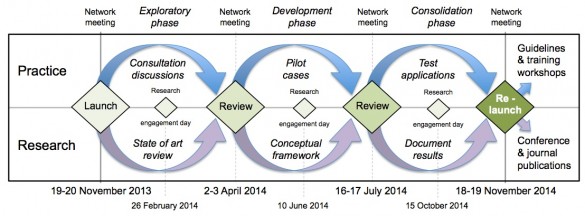Strategic Technology and Innovation Management Consortium 2014
2014 Programme
The Strategic Technology & Innovation Management (STIM) Consortium is a practice-oriented research and networking collaboration between industrial member companies and the Centre for Technology Management.

Members of the Consortium benefit from:
- Access to a network of firms from a range of industry sectors to share experience through a regular series of meetings and engagement in individual research projects.
- The opportunity to influence the direction of research and development, with the associated early benefits gained through participation in case studies and application pilots.
- Transfer and application of methods developed, enabled by guidance notes and training packages.
A summary of the 2013 and 2015 programme and research portfolio can be found below:
Download the STIM Consortium flyer here.

To find out more, and how you can participate in the Consortium, please contact: Dr Rob Phaal E: rp108@cam.ac.uk

2014 Research project portfolio
There were 9 research projects in the 2014 STIM programme portfolio, summarised below.
1. How is technology intelligence assimilated in decision making?
This project focused on the progression of decision makers’ awareness of emerging technologies, to identify how emerging technologies move up in importance in firm strategy. The research builds on previous work on technology intelligence and how it is communicated and perceived by decision makers.
Contact: Dr Letizia Mortara
2. ‘Marketing’ process for technology
This project aimed to develop an approach to identify problems that a technology can solve, at the earlier stages of the innovation, to enhance the exploitation opportunities technology can provide the business. The research builds on previous work on technology marketing and intelligence.
Contact: Clare Farrukh
3. Early stage project selection
This project explored how organisations can appraise and select pre-commercial technological (and other) competences, in order to invest in their development. The research builds on previous work to develop guidance for selecting projects that are at a stage where commercial exploitation can be envisaged.
Contact: Professor Rick Mitchell
4. Capturing 'white space' R&D opportunities using equity crowdfunding
‘White space’ opportunities are those with a poor fit to the current organisation and customers (new and existing) being served in fundamentally different ways. This project explored the role that emerging crowdsourcing and crowdfunding internet platforms might contribute to exploiting the opportunity presented by white space.
Contact: Dr Chris van der Hoven
Innovation education is essential for helping to improve the skills and decision-making of those involved in the innovation process. This project aimed to develop an innovation simulation to help companies better understand the challenges of allocating resources appropriately when developing and launching new products, building on previous experience with educational simulation activities.
Contact: Dr Simon Ford
Uptake and utilisation of management tools is a challenge in industry; especially given the need to select, adopt and integrate individual tools into a toolkit that can be implemented within their current organisational processes and systems. This research project generated a scalable toolkit platform, through leveraging previous research and industrial engagements.
Contact: Dr Clive Kerr
Portfolio perspectives are fundamental for managers and their common depiction is a basic ‘bubble’ chart. Typically, the execution of such visuals is relatively poor and lacks a robust approach to presentational style and information content. Taking an approach that attempts to balance data provision with the needs of users for information comprehension, this project developed a prototypal visual representation for depicting portfolios.
Contact: Dr Clive Kerr
Value creation for companies involved in R&D and product launch presents many challenges. Recently completed research has highlighted the need for managers to track the value of work being done during the realisation states of a product. This project built on this research, focusing on how information can be communicated between stakeholders involved in assessing options, and ways in which the decisions taken can be tracked to project outcomes and value created.
Contact: Dr Val Lynch
9. Issues for R&D location, with a focus on China
China has been one of the preferred destinations for companies to leverage its labour dividend and fast growing domestic market. However, is China a suitable location for conducting R&D activities? The aim of this project was to develop a checklist of important issues that a company must consider before locating its R&D activities to China.
Contact: Quan Zhou
10. Strategic ‘platforms’ and their depiction in roadmapping
The objective of this MPhil project was to explore and define the meaning of 'strategic platforms' - e.g. product, technology and process platforms, and how these can be deployed in roadmapping tools and related approaches such as life cycle analysis, contributing to both theory and practice. The research will build on established principles from the literature, developing and testing integrated frameworks through collaboration with STIM companies.
Contact: Rob Phaal










